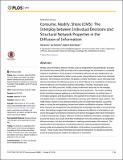| dc.contributor.author | Koren, Hila | |
| dc.contributor.author | Raban, Daphne Ruth | |
| dc.contributor.author | Kaminer, Ido Efraim | |
| dc.date.accessioned | 2017-05-17T20:30:42Z | |
| dc.date.available | 2017-05-17T20:30:42Z | |
| dc.date.issued | 2016-10 | |
| dc.date.submitted | 2016-04 | |
| dc.identifier.issn | 1932-6203 | |
| dc.identifier.uri | http://hdl.handle.net/1721.1/109156 | |
| dc.description.abstract | Widely used information diffusion models such as Independent Cascade Model, Susceptible Infected Recovered (SIR) and others fail to acknowledge that information is constantly subject to modification. Some aspects of information diffusion are best explained by network structural characteristics while in some cases strong influence comes from individual decisions. We introduce reinvention, the ability to modify information, as an individual level decision that affects the diffusion process as a whole. Based on a combination of constructs from the Diffusion of Innovations and the Critical Mass Theories, the present study advances the CMS (consume, modify, share) model which accounts for the interplay between network structure and human behavior and interactions. The model's building blocks include processes leading up to and following the formation of a critical mass of information adopters and disseminators. We examine the formation of an inflection point, information reach, sustainability of the diffusion process and collective value creation. The CMS model is tested on two directed networks and one undirected network, assuming weak or strong ties and applying constant and relative modification schemes. While all three networks are designed for disseminating new knowledge they differ in structural properties. Our findings suggest that modification enhances the diffusion of information in networks that support undirected connections and carries the biggest effect when information is shared via weak ties. Rogers' diffusion model and traditional information contagion models are fine tuned. Our results show that modifications not only contribute to a sustainable diffusion process, but also aid information in reaching remote areas of the network. The results point to the importance of cultivating weak ties, allowing reciprocal interaction among nodes and supporting the modification of information in promoting diffusion processes. These results have theoretical and practical implications for designing networks aimed at accelerating the creation and diffusion of information. | en_US |
| dc.language.iso | en_US | |
| dc.publisher | Public Library of Science | en_US |
| dc.relation.isversionof | http://dx.doi.org/10.1371/journal.pone.0164651 | en_US |
| dc.rights | Creative Commons Attribution 4.0 International License | en_US |
| dc.rights.uri | http://creativecommons.org/licenses/by/4.0/ | en_US |
| dc.source | PLoS | en_US |
| dc.title | Consume, Modify, Share (CMS): The Interplay between Individual Decisions and Structural Network Properties in the Diffusion of Information | en_US |
| dc.type | Article | en_US |
| dc.identifier.citation | Koren, Hila; Kaminer, Ido and Raban, Daphne Ruth. “Consume, Modify, Share (CMS): The Interplay Between Individual Decisions and Structural Network Properties in the Diffusion of Information.” Edited by Yongtang Shi. PLOS ONE 11, no. 10 (October 2016): e0164651. © 2016 Koren et al | en_US |
| dc.contributor.department | Massachusetts Institute of Technology. Department of Physics | en_US |
| dc.contributor.department | Massachusetts Institute of Technology. Research Laboratory of Electronics | en_US |
| dc.contributor.mitauthor | Kaminer, Ido Efraim | |
| dc.relation.journal | PLOS ONE | en_US |
| dc.eprint.version | Final published version | en_US |
| dc.type.uri | http://purl.org/eprint/type/JournalArticle | en_US |
| eprint.status | http://purl.org/eprint/status/PeerReviewed | en_US |
| dspace.orderedauthors | Koren, Hila; Kaminer, Ido; Raban, Daphne Ruth | en_US |
| dspace.embargo.terms | N | en_US |
| dc.identifier.orcid | https://orcid.org/0000-0003-2691-1892 | |
| mit.license | PUBLISHER_CC | en_US |
| mit.metadata.status | Complete | |
